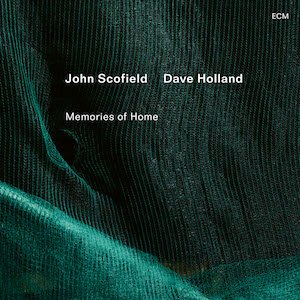Label: ECM Records, 2025
Personnel - John Scofield: guitar; Dave Holland: double bass.
American guitarist John Scofield and British bassist Dave Holland, two jazz heavyweights with a tremendous shared oeuvre, join forces for their first duo record, join forces for their first duo record, Memories of Home. Recorded after extensive touring together, the album its something to stick with, as they refine and hone abundant musical ideas in nine old and new compositions—five by Scofield and four by Holland. In the past, they spread their talent in projects by pianist Herbie Hancock and saxophonist Joe Henderson, and co-led the quartet ScoLoHoFo with saxist Joe Lovano and drummer Al Foster.
The album couldn’t have a better start than with Scofield’s “Icons at the Fair”, a phenomenal piece inspired by Hancock’s arrangement of “Scarborough Fair” on The New Standard (Verve, 1996). Its catchy American sound—rooted in blues and folk—is quintessential Scofield. Mastering his octaves technique, he begins with a crisp single-note narrative before infusing rich chords over Holland’s driving, athletic lines. The bassist follows with a hyper-articulated solo, eventually trading phrases with his musical partner before redirecting to the tune's theme.
The following three pieces, all penned by Scofield, show these singular artists in top form, revealing their deep understanding of the material and elevating it through their craft. “Meant To Be”, a mesmerizing 3/4 post-bop classic from 1991, is played here with warmth and stylish finesse. “Mine Are Blues”, a new composition, brings expressive synchronicity to its main melody, swinging unabashedly until its glorious finale. “Memorette”, another 3/4 tune, relies on Holland’s bass dances and melodic insight.
Of Holland’s four previously recorded compositions, three gained notoriety through his quintet. Both “Mr. B”, a dedication to bassist Ray Brown that swings as sharp as a tack, and the groove-centered “Not For Nothing”, which retains its original 5/4 meter and features Scofield’s amazing comping, were first recorded with Holland’s famed vibraphone-equipped quintet. In turn, the straight-ahead “You I Love”—packed with invigorating walking bass and bluesy guitar chops—first appeared with a different quintet, Holland’s earliest, featuring a three-horn frontline with trumpeter Kenny Wheeler, altoist Steve Coleman, and trombonist Julian Priester. The album closes with the title track, a ballad with a pronounced country feel.
Scofield and Holland push each assertively into groovy territory. No matter what they play, they always find a way to pull focus and draw you in. This joint effort is a must-have for any jazz lover.
Favorite Tracks:
01 - Icons at the Fair ► 02 - Meant To Be ► 03 - Mine Are Blues ► 08 - You I Love














